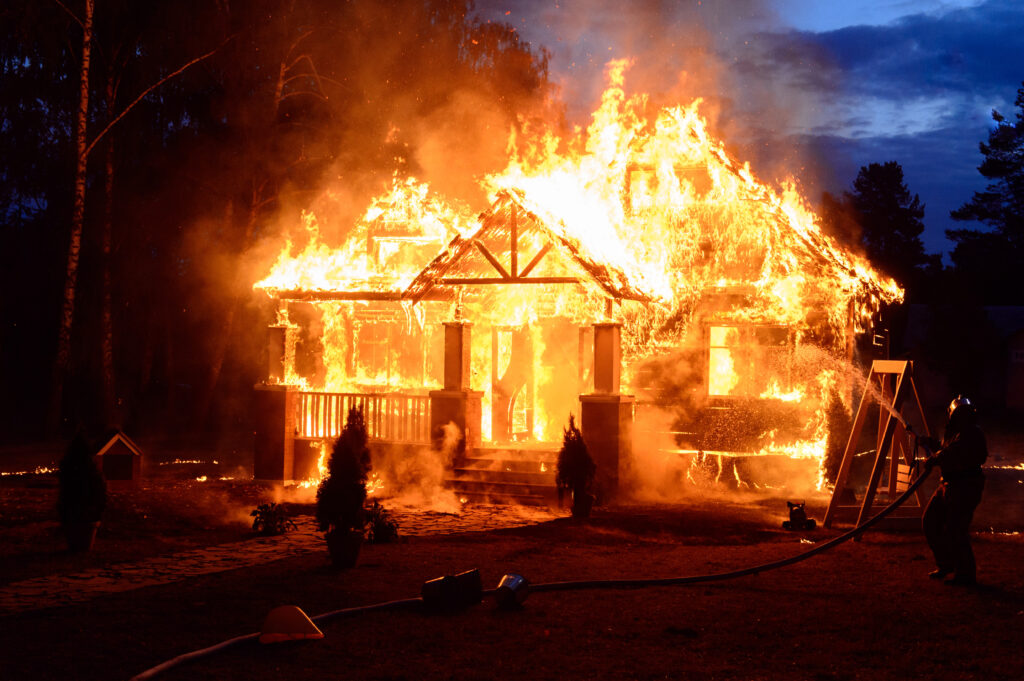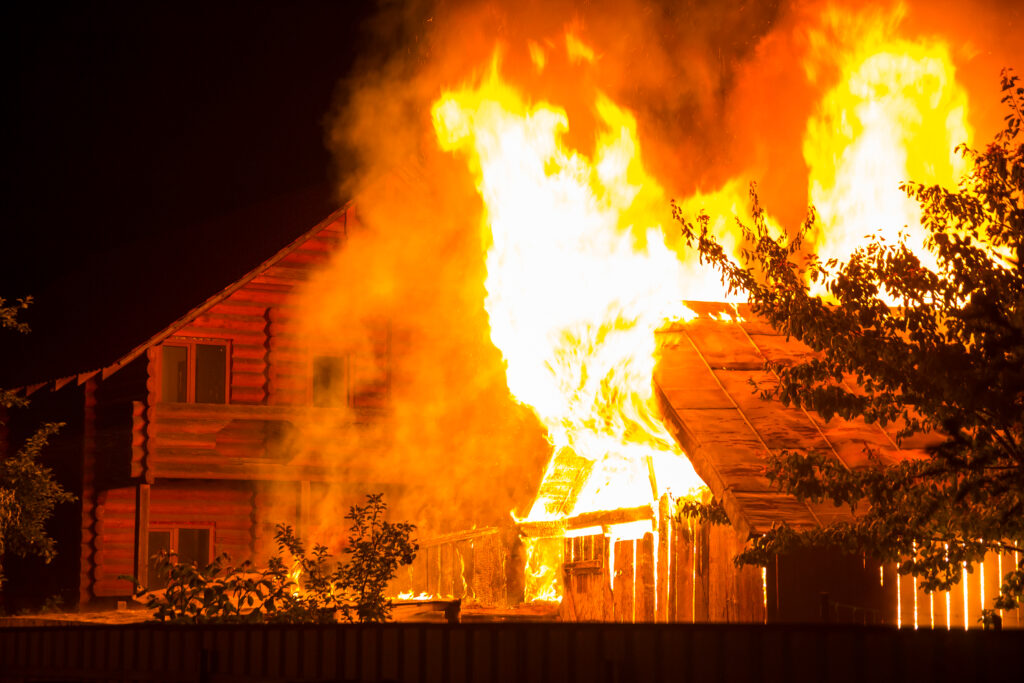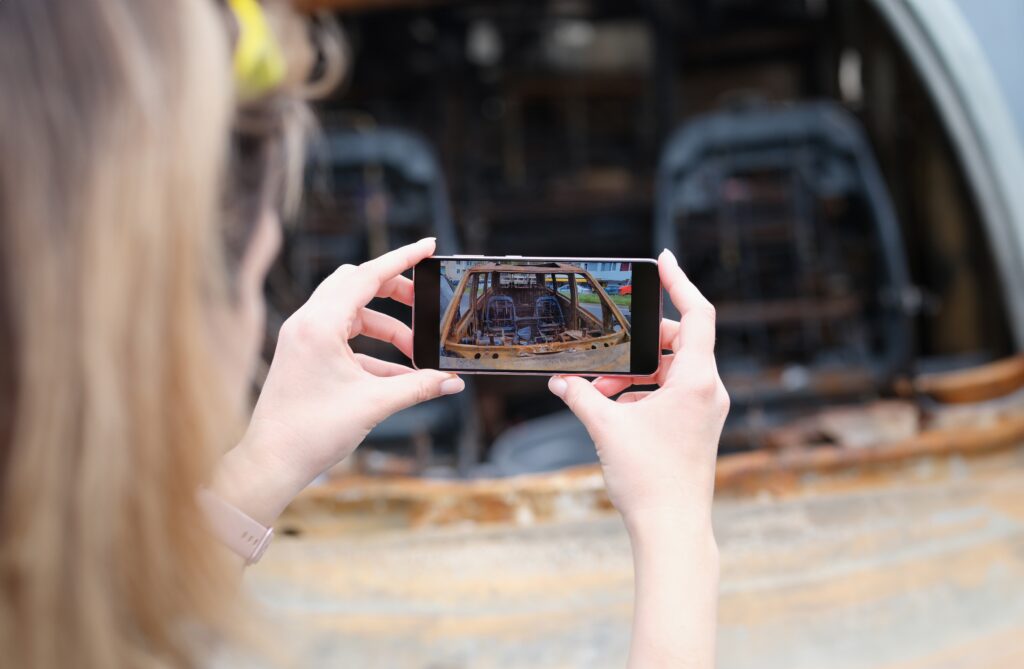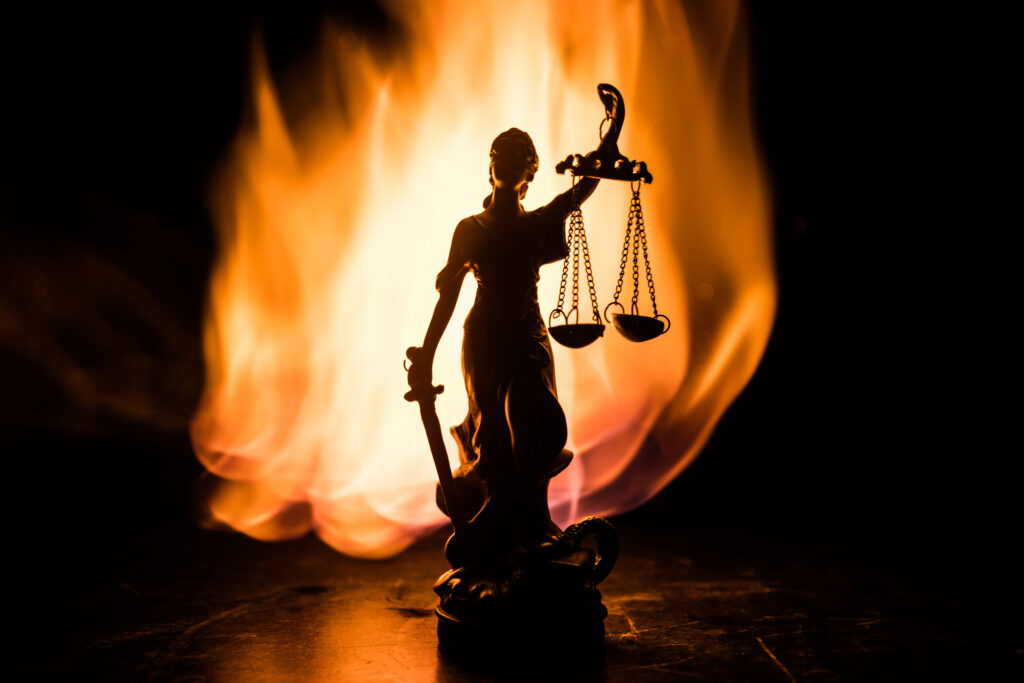Wildfires can destroy homes, businesses, and natural landscapes. When a wildfire happens because a big company or similar party may have acted carelessly, people sometimes file lawsuits to recover their losses. In those cases, the law can cover different kinds of “property damage.” But what does that mean? What types of damage can you include in a wildfire lawsuit if a corporate or similar entity might be responsible?

What Is Property Damage in a Wildfire Lawsuit?
Property damage generally means any harm done to your house, land, or things you own. In the context of a wildfire lawsuit, it can include:
- Physical Damage to Property: Like a burned-down home or destroyed barn.
- Loss of Use: If you cannot live in or use your property because of the fire.
- Damage to Land or Environment: Charred trees, ruined soil, or harmed wildlife habitat.
- Lost Profits: If your business suffered financially from the fire.
- Emotional Distress Connected to Property Damage: Losing your home or land caused mental suffering.
California courts recognize the different ways in which harm can occur. If someone else caused the wildfire, you can recover money for these losses.
Why Does Property Damage Matter in Wildfire Lawsuits?
When a wildfire occurs, and a big party is at fault, courts examine the damage caused. This helps decide how much money victims should get. In many cases, that damage is enormous. Houses might burn to ashes. Land can be scorched. People can lose their entire way of life.
Property damage is the core of these lawsuits. Without it, there is no harm to prove in court. However, with it, victims have a clearer legal path to show they suffered and deserve compensation.
For example, in Fire Ins. Exchange v. Superior Court (181 Cal. App. 4th 388), the court noted that property damage can include the actual harm to the physical structure plus any other losses that flow from it.
What Is Physical Property Damage?

Physical property damage is the most obvious kind. When a wildfire sweeps through, it can destroy:
- Homes or Buildings: The structure and everything inside.
- Fences or Other Fixtures: Barns, sheds, or attached decks.
- Personal Belongings: Furniture, clothes, electronics.
If your property was burned or destroyed, that is physical damage. You may claim money for repairs or the cost of rebuilding. Courts also consider whether you lost personal items, like family photos, that you cannot easily replace.
In some lawsuits, you must show exactly how the fire damaged each item. Keep records, photos, and receipts if you can. The court might want evidence that your property was truly there and had a certain value.
Can You Recover for Loss of Use?
Yes. Loss of use means you cannot live in or use your property while it is destroyed or repaired. If you cannot stay in your home, you might have to pay for a hotel or rent a new place. That adds to your expenses.
In wildfire litigation, this is a valid claim. If a big company caused the fire, you might seek compensation for the extra cost of living elsewhere. You can also seek compensation if your business on that property cannot operate during the repairs.
For example, Adamo v. Fire Ins. Exchange (219 Cal. App. 4th 1286) shows that costs you spend to mitigate (lessen) damage or to secure temporary housing can be part of the overall damages. While that case also mentioned insurance aspects, the main takeaway is that the law can account for extra expenses you face because you lost the use of your property.
Does Ecological or Environmental Damage Count?

Yes, it can. Wildfires can harm trees, soil, wildlife, and water sources. If you own land carefully managed for timber, crops, or just scenic beauty, a major fire can ruin that.
Under Health & Safety Code § 13009.2, you might recover costs if a negligent party damaged your land or environment with a fire. This can include the cost to restore the land to its prior condition, the lost value of trees or crops, or even the loss of scenic or habitat value.
Courts sometimes look at:
- The cost of reforestation
- Lost habitat for animals
- Changes in soil or water quality
For instance, if your land was a beautiful oak forest that you used for events, the fire might reduce that land’s value. You can seek money for the cost of restoring or the difference in what your land is worth now versus before.
Can You Get Money for Lost Profits or Business Losses?
Yes. If you ran a business on your property, such as a farm or a store, and the wildfire ruined your inventory or forced you to shut down, you might have a valid claim for lost profits. Courts in California often allow these claims if you can show a clear link between the wildfire and your financial losses.
For example, the court allowed lost profit claims after a fire in McKay v. State of California (8 Cal. App. 4th 937). That means you might recover the difference if you can prove your business was making money or projected to make money, and the wildfire destroyed that opportunity.
However, you need records. Keep your balance sheets, revenue logs, or statements to show what you typically earn. The court wants to see how much you lost, not just guesses.
What If Only Part of My House Burned?

Partial damage still counts. You can claim the cost of repairing or replacing the burned section. For example, you do not need a total loss to file a claim if you lose half your roof. Even smoke damage can lead to major repairs, cleaning, or property devaluation.
The key is to show that the wildfire was the cause. In lawsuits against big companies, the defendant might argue that your damages were minor or not fully caused by the fire. You gather evidence—photos, receipts, inspection reports—to prove what happened.
How Are Damages Calculated for Trees and Plants?
Trees and plants can have value beyond just lumber or produce. Some people have prized orchards or old-growth forests.
If these are damaged, you can claim:
- Replacement Cost: The cost of buying and planting new trees.
- Loss in Property Value: If the land is now worth less because the trees were important.
- Lost Income: If you sold fruit, timber, or other products from the trees.
Courts recognize that vegetation has economic and sometimes emotional value, especially if it is part of a business or a key feature of the property.
Are Water and Soil Contamination Covered?
Yes. Wildfires sometimes lead to contamination, especially if chemicals are released or burned materials seep into the soil or water. If your land’s water source is compromised, or the soil can no longer support crops, you can claim the cost to fix these problems or the lost value.
Again, you need evidence. Soil tests, water quality reports, and professional evaluations can show how bad the damage is and what it will cost to correct.
What Is the Difference Between Tangible and Intangible Damage?
- Tangible Damage: Physical harm to real things, like buildings or items.
- Intangible Damage: This might be like a reduced scenic view or lost enjoyment of property.
In wildfire lawsuits, tangible damage is easier to measure. However, intangible losses can matter too—like the aesthetic value of your once-beautiful forest is now blackened. Sometimes, courts award money for that lost “use” or “pleasure” if it can be shown real, concretely.
Can Public Agencies Recover Property Damage?
Yes, but they typically do so on behalf of the government or the public. For example, the state can recover environmental damage if a corporate party starts a fire that burns public land. They might also reclaim costs for fighting the fire.
Private individuals do not get money from those suits, but sometimes, their evidence can help your claim if you also sue the same party.
Is There a Time Limit to Claim Property Damage?
Yes. There is a statute of limitations in California. You typically have a certain number of years (often two or three) from the fire date to file a lawsuit. If you wait too long, you might lose your right to seek compensation.
Talking to a California wildfire litigation attorney makes sense when you have property damage from a fire potentially caused by a corporate party. They can help ensure you do not miss deadlines.
What Evidence Is Needed to Prove My Damages?

You must show that:
- The wildfire harmed your property.
- A corporate or large party was responsible for causing the fire.
- How much money will be needed to fix or replace what you lost?
- Any additional losses, like lost profits or emotional distress, that flow from the property damage.
Often, people rely on:
- Photos and Videos: Showing the property before and after the fire.
- Receipts and Invoices: For your home, belongings, or business items.
- Professional Reports: These include valuations for your land or estimates for repair.
- Witness Statements: Others might confirm your property was in good shape before.
A strong paper trail helps you win a fair amount.
Can I Claim Damage Even if Insurance Paid for Some Of It?
Yes, but you must disclose that your insurer paid a portion. The defendant does not get to walk away because you have insurance, but you usually cannot collect twice for the same loss.
If your insurance paid some of your claims, you might sue for additional amounts your policy did not cover, such as deductibles, upgrades, or emotional distress. Also, your insurer might join the lawsuit to recover the money they already paid you.
Does Coverage Differ for Commercial Versus Residential Property?
The types of damage you claim might differ. For commercial property, lost profits and damage to business equipment are often key. For a residential property, the focus might be rebuilding your home and emotional distress.
However, both types can appear in a single lawsuit if you, for example, both lived and ran a business on your land. The law does not stop you from seeking all relevant damages in one case as long as you can show how the wildfire caused each type of loss.
Can You Get Help with Future Repair Costs?
Yes, in some cases. If you know that you will face more costs down the line—for instance, the land might be unstable and need regrading or replanting—courts can award “future damages” if they believe these costs are likely. You might need a professional to testify that your slope will erode or your orchard will need replanting in stages.
Future damages can also include long-term business losses if, for instance, it takes time for your vineyard to regrow or your tourist lodge to rebuild.
Does the Court Look at the Market Value of My Property?
Often, yes. If a wildfire destroys your house or building, courts might compare its fair market value before and after the fire. The difference can be part of your damage claim. Alternatively, if you intend to rebuild, you might claim the cost of reconstruction, whichever is less.
If your property is unique—like a historical building or a specialized farm—you might need appraisers who understand its special value. Ordinary real estate valuations might not capture the true cost of losing something one-of-a-kind.
Types of Property Damage Covered in Wildfire Litigation
- Physical Damage to Structures and Belongings (houses, businesses, personal items)
- Loss of Use (costs of living elsewhere, inability to use your land)
- Environmental and Ecological Harm (trees, soil, wildlife habitats)
- Diminution in value (your land or property is now worth less)
- Lost Profits (business income you lost due to the fire)
- Emotional Distress Linked to Property Loss
- Repair or Restoration Costs (including future expenses)
- Fire Suppression or Mitigation Expenses (efforts to save your property)
How Does a California Wildfire Litigation Lawyer Help?

A California wildfire litigation attorney knows the laws, deadlines, and evidence needed to prove your claims. They can gather documents like receipts, photos, and professional estimates. They also know how to show a court (or a settlement negotiator) the full scope of your losses—everything from the cost of repairs to environmental harm on your land.
They understand previous cases, like Hensley v. San Diego Gas & Electric Co. or McKay v. State of California, which show that you can get money for emotional distress and lost profits. They also know about Health & Safety Code § 13009.2, which allows for recovery of damages caused by a fire.
Working with a lawyer makes it more likely you will see a fair outcome, especially if the party at fault is a large corporation with many resources. Lawyers can handle negotiations, gather professional testimony, and fight for your rights in court if needed.
Contact a California Wildfire Litigation Lawyer Now
If you have suffered from a wildfire and believe a corporate entity is responsible, do not wait. Call 1-800-WILDFIRE and reach out to a California wildfire litigation attorney today. They will guide you through collecting evidence, valuing your losses, and taking legal steps. With professional help, you can better protect your rights and work toward rebuilding what was lost.